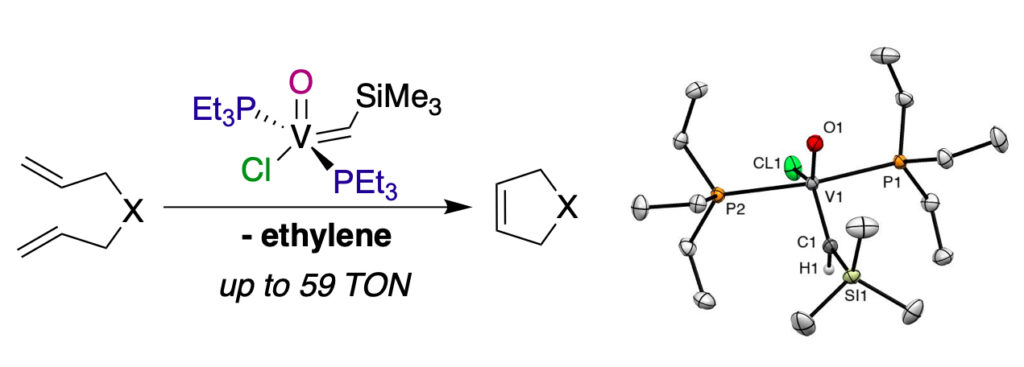Olefin metathesis is a vital reaction in research and industrial applications that utilizes heterogeneous and homogeneous transition metal catalysts. Starting as a mysterious reaction where polymerization of norbornene catalyzed by ill-defined Ti complexes that led to an unsaturated polymer seven decades ago, it is now a well-understood chemical transformation based on a robust mechanism involving transition metal carbene complexes. Essential well-defined homogeneous catalysts for olefin metathesis are based on Ru, Mo, and W alkylidene complexes. Those catalysts are used in the synthesis of polymers, petrochemicals, agrochemicals, pharmaceutical compounds, and natural products. The tremendous success of the olefin metathesis reaction was possible due to the development of reliable methods of synthesis transition metal carbene complexes in the last few decades. Our projects focus on the synthesis of V, Fe, Mo, and W carbene complexes and their application for olefin metathesis and other catalytic transformations.
V
High-oxidation-state V alkylidene complexes have been extensively explored for the ring-opening metathesis polymerization of various cyclic alkenes in the last decade. However, the examples of V catalyzed olefin metathesis of acyclic olefins such as ring-closing metathesis and cross-metathesis are limited due to the lack of a current method to vary a ligand set around V. This project focuses on the development of the alternative approach for the synthesis of V alkylidenes and the systematical study of the influence of size and the electronic characteristics of the ligand set around the metal on olefin metathesis.

Fe
Our project focuses on the synthesis, characterization, and development of the Fe alkylidene catalysts for olefin metathesis. Despite the extensive theoretical and experimental studies to the best of our knowledge, there are no successful examples of Fe-catalyzed olefin metathesis. The long-standing goal of this project is to not only complement existing processes but to discover a new type of reactivity of Fe alkylidene complexes considering the unique electronic structure of the first-row metals.

Mo/W
Nowadays, the vast majority of Mo/W alkylidene catalysts for olefin metathesis are prepared using the “classical” method based on the alpha-hydrogen abstraction reaction of Mo dialkyls. The second approach is based on the protonation of alkylidynes. Recently we discovered a system that produces catalytically active Mo carbene complexes from Mo benzylidyne in the presence of olefins in situ. This project focuses on elucidating the alkylidene formation mechanism, which does not include alpha-hydrogen abstraction or alkylidyne protonation.
